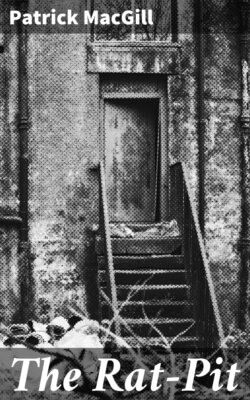Читать книгу The Rat-Pit - Patrick MacGill - Страница 11
На сайте Литреса книга снята с продажи.
I
ОглавлениеTable of Contents
THE hour was half-past ten in the forenoon. In the village (“town” the peasantry called it) of Greenanore two rows of houses ran parallel along a miry street which measured east to west some two hundred yards. At one end of the street were the police barracks and at the other end the workhouse. Behind the latter rose the Catholic chapel, and further back the brown moors stretched to the hills which looked down upon the bay where the women crossed in the early morning.
The houses in the village were dull, dirty and dilapidated. There were eight public-houses, a few grocers’ shops, a smithy where the blacksmith, who mended scythes or shod donkeys, got paid in kind for his services. The policemen, one to every fifty souls in the village, paraded idly up and down the street, their heavy batons clanking against their trousers, and their boots, spotlessly clean, rasping eternally on the pavement. Their sole occupation seemed to be the kicking of unoffending dogs that spent their days and nights in a vain search for some eatable garbage in the gutter. The dogs were skeletons; and when kicked they would slink quietly out of the way, lacking courage either to snap or snarl. Even a kick brought no yelp from them, they were almost insensible to every feeling but that of the heavy hunger which dulled their natural activity. At night they were silent ghosts prowling about looking for a morsel to eat. Now and again they howled mournfully, sitting on their haunches in a circle; and when the people heard the lonely sound they would say: “There, the dogs are crying because they have got no souls.”
A little pot-bellied man stepped briskly along the street of the village, one gloved hand grasping a stout stick, the other, also gloved, sunk in the capacious pocket of a heavy overcoat. He walked as if he lacked knee-joints, throwing the legs out from his hips, but, save for this, there was nothing remarkable about the man except perhaps his stoutness. The people of Greenanore, battling daily against the terrible spectre of hunger, had no time to grow fat, yet this man measured forty inches round the waist. In the midst of extreme poverty he, strange to say, had grown corpulent and rich. His name was Farley McKeown, now possessor of £200,000, part of it invested in South American Railways and part of it in the Donegal Knitting Industry, and nearly all of it earned in the latter.
Farley McKeown was now seventy years of age and unmarried. At one time, years before, he had his desires as most young men have, and the sight of a comely girl going barefooted to Greenanore imparted a fiery and not unpleasant vigour to his body and caused strange but not unnatural thoughts to enter into his mind. He was then a young man of twenty, thoughtful and ambitious. Although his father was poor, the boy, educated by some hedge schoolmaster, showed promise and evinced a desire to become a priest. “It is an easy job,” he said to himself, “and a priest can make plenty of money.” Farley McKeown desired to make money anyway and anyhow.
When the black potato blight, with the fever and famine that followed it, spread over Donegal, Farley McKeown saw his chance. By dint of plausible arguments he persuaded a firm of Londonderry grain merchants to ship a cargo of Indian meal to Greenanore and promised to pay for the consignment within two years from the date of its arrival. When the cargo was landed on Dooey Head the people hailed it as a gift from God and the priest blessed Farley McKeown from the altar steps. The peasants built a large warehouse for McKeown, and in return for the work they were allowed a whole year in which to pay for their meal. Meanwhile the younger generation went off to America, and money flowed in to Donegal and Farley McKeown’s pocket. At the end of two years he had paid the grain merchants, but the peasants found to their astonishment that they had only paid interest on the cost of their food. They were in the man’s clutches, always paying for goods received and in some strange way never clear of debt. This went on for years, and Farley McKeown, a pillar of the Church and the friend of the holy priest, waxed wealthy on the proceeds of his business.
Then he started a knitting industry and again was hailed by the priest as the saviour of the people. From far and near, from the most southerly to the most northerly point of Donegal the peasant women came to Greenanore for yarn, crossing arms of the sea, mountains and moors on their journey, and carrying back bundles of yarn to their homes. The journey was in many cases thirty miles each way, and these miles were tramped by women between a sleep and a sleep, often with only one meal in their stomachs.
The daughters of Donegal are splendid knitters. But how difficult to make are those wonderful stockings when there is nothing but the peat fire or the rushlight to show the women the dreary and countless stitches that go to make the whole marvellous work. How quick those irons flash in the firelight, how they tinkle, tinkle one against another as the nimble fingers wind the threads around them, but alas! how wearying the toil! And the time usually taken to make a pair of socks was sixteen hours, and the wages paid for sixteen hours’ work was a penny farthing.
